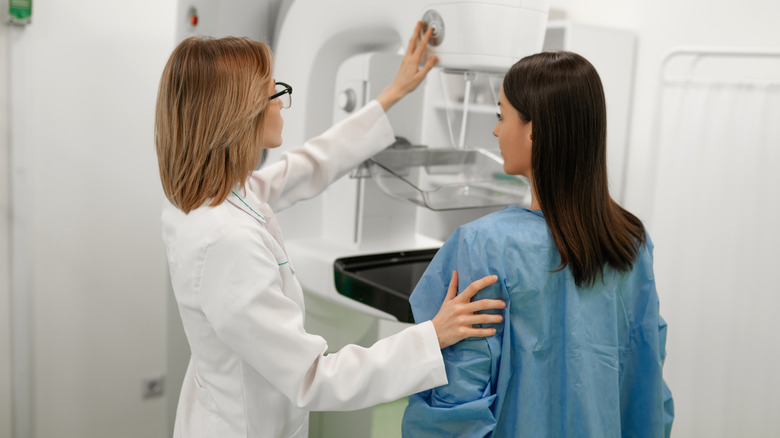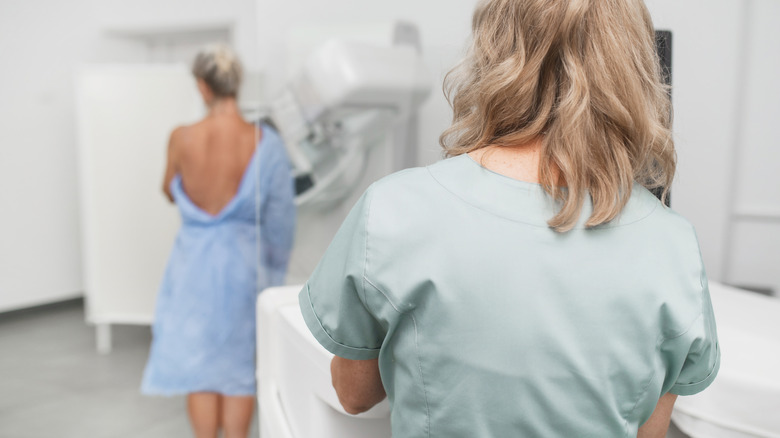Cancer Screenings Medicare Gives Seniors For Free
Medicare is a vital government-run health insurance program. It's designed to serve those 65 and over, but also extends to numerous others in need. Medicare is divided into parts; certain components cover prescription medication needs while others offer general wellness coverage. Medicare Part A is used for hospital treatment, while Part B is the standard medical insurance that most people will be familiar with. There are several free Medicare benefits you can take advantage of throughout the year, but keep in mind that some states plan to implement changes in 2026, including AI-based approval for certain services.
Another important area that Medicare covers is cancer screenings. Roughly two million Americans are diagnosed with cancer every year, but programs designed to support these patients are widely available. For instance, the Compassionate Allowance List helps fast-track disability and other Social Security benefits for those with certain cancers. Thanks to the free Medicare cancer screenings, you can easily track your health in this arena without any additional financial burdens. These cancer-defense tools can help seniors stay on top of their health and get ahead of any treatment needs that may arise.
Lung cancer screenings
Lung cancer is the deadliest form of the disease and is the leading cause of death among cancer-related fatalities across the globe, affecting men and women of all ages. Even non-smokers are at risk, despite common misconceptions. While smoking sharply raises your risk, lung cancer can affect individuals regardless of personal tobacco use habits. Secondhand smoke is another culprit in developing the disease, but even that isn't a prerequisite.
For those between 50 and 77, Medicare will cover an annual screening for lung cancer. As is the case with other cancer screenings the program offers, this is an essential benefit that should be used regularly. Attending your screening appointments allows you to stay on top of a serious aspect of your health. As you age, your risk of getting cancer also increases. This means that most people on the Medicare program will have a naturally higher predisposition for the disease than those not using its coverage, without taking into consideration any lifestyle choices in the past or present.
Utilizing these services every year allows you to rest easy knowing that you don't have cancer, or to take steps to combat the disease with confidence because you've caught the growth early. It's a scary thing to think about, but if you don't get checked, skipping screenings means missing the chance to detect and treat cancer early.
Gender-specific cancers and more
While men can get breast cancer, it primarily affects women. Conversely, women don't have to fear prostate cancer. Still, over 600,000 people in America will be diagnosed with either breast or prostate cancer, split almost evenly. Medicare provides yearly check-ins for both types. Women aged 40 and older are eligible for a free yearly mammogram under Medicare. Despite this coverage, 60% of American women skip annual screenings. Annual mammograms are the first line of defense, alongside self-checks that can be done at home, in identifying suspicious growth.
For men, prostate screenings are also included in your annual Medicare catalog of included services. Prostate cancer is nearly as common as breast cancer, and the risks increase with age. Starting at age 50, Medicare will cover a free digital rectal exam each year, as well as a prostate-specific antigen lab test.
Colorectal screenings and cervical cancer tests are also included annually for Medicare recipients. Cervical cancer testing is covered every two years for routine patients and annually for high-risk individuals. Colorectal testing follows a staggered schedule. Coverage includes an annual fecal occult blood test starting at age 45, and other tests on varying schedules to help stay on top of another deadly adversary.


